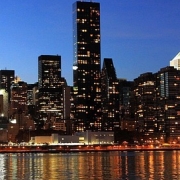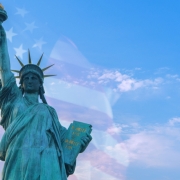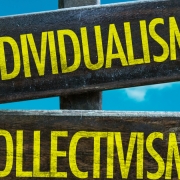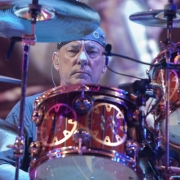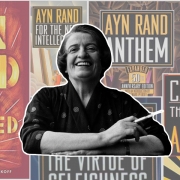The frigid Russian winter, an apartment with little heat and less food, and endless hours standing in lines, day after day, searching for work that didn’t exist, was finally rewarded – a diagnosis of incipient tuberculosis for Leo. As his doctor told Kira at the beginning of Chapter 16 in Ayn Rand’s 1936 novel, We the Living, “Tuberculosis is a serious disease, citizen. In Soviet Russia – it is a fatal disease. If that young man is dear to you, send him south. If you have a human possibility, or an inhuman one – send him south.”
Later that day, Leo had decided “Don’t let’s think about it. There is nothing we can do.” To which Kira replied, “Nonsense, Leo. You’re going south.” Kira’s focus and determination is essential and normal to her life premise, not calamity. Misfortune is to be handled quickly and forgotten. It is human nature to take rational action, to control one’s environment, to live. Gen Z entrepreneurs know this. President Trump really knows this. Nineteen years ago last week, on Flight 93, Todd Beamer and his compatriots knew this and declared, Let’s Roll!
Over the next two weeks, Kira waited hours in “ghastly lines of deformed creatures – the smell of the morgue” at three hospitals. At the State Medical headquarters, it was “hours of waiting in dim, damp corridors that smelt of carbolic acid and soiled linen.” Reminiscent of President Obama, it was a teachable moment; “a mystic absolute, one had to be a member of a Trade Union and get a dispatchment to a Trade Union Sanatorium.” Or qualify for healthcare.gov marketplace subsidies.
After countless meetings with Trade Union heads, their secretaries, recommendation letters, exceptions begged, and bribes demanded, Kira asked for help from her cousin Victor who replied, “I want you to realize that my party membership is a sacred trust not to be utilized for purposes of personal advantage.” Kira remained undaunted, “She was firm, erect, her voice did not tremble. She was not afraid to beg. It was her mission, her quest, her crusade.” What Kira wanted was rooted in her highest values – her life, and she loved Leo.
Earlier, in Chapter 14, Kira had been called to visit her Aunt Maria who had become deathly sick from a hemorrhage,
She jerked up. Eyes were wide open with a horror beyond all human dignity. Staring at Kira, she screamed, I want to live! I want to live! She fell back. Her hair jerked like snakes on the pillow and lay still. Nothing moved but the black that slithered down the skin of her throat.
Following doctors’ orders, and desperate to help Leo, Kira paid an unannounced visit to her Soviet friend Andrei in Chapter 17. He then tells her that she is his highest value, “My life is twenty-eight years of that for which you feel contempt. I’d give everything I have – everything I could ever have – for something you can’t give me!” She breathed, “What did you say Andrei?”
It was terror in her eyes, a terror of the thought she had seen for a second so very clearly. She was not thinking of him; she was not thinking of Leo; she was thinking of Maria Petrovna and of the red bubble on dying lips.
Aunt Maria Petrovna had lived her life preparing for death. Her moral choices were guided by the mystics of the mind – the Church. Upon facing imminent death, Maria realized her error and turned to the only person she knew who chose to live. Andrei’s moral choices were guided by the mystics of muscle – the Party. He lived his life for the battle, one that could only end in death, yet he was beginning to realize that he was wrong.
While Kira admired Andrei’s masculinity and independence, which is President Trump’s offense, and qualities of Leo, she abhorred Andrei’s values. Kira understood that Andrei’s devotion to her and the Party would lead him to a similar fate as Aunt Maria’s sacred trust in miracles and the Church. For Kira, the much higher value was her life, and to the extent she could succeed, her future with Leo.
This is in sharp contrast to the conditions that exist in a society that adopts ‘Democratic Socialism.’ When a criminal gang controls prosecutors offices or court benches, transparency disappears, along with evidence and witnesses. Last week, the US Department of Justice disclosed that senior staff on Robert Mueller’s Special Counsel team had erased data from over 20 smartphones. This is the kind of obstruction for which they accuse others, and use it to justify middle of the night, no-knock SWAT raids on their political targets.
One of the several targets whose life and treasure have been ruined is Julian Assange, who has been held in a high security prison since last spring, following years of exile in an embassy in London. His extradition hearing to the United States began last week, and he faces up to 175 years on espionage charges. While Assange exposed corruption at the Democratic National Committee in 2016, he’s been under criminal investigation by the Obama Administration since 2010.
It seems Assange had published information that harmed the sensitivities of Obama era CIA and Pentagon officials over ‘misinformation’ regarding their war machine. In We the Living, millennial Leo Kovalensky also faced the consequences of Marxist class warfare, and Kira’s efforts with the Soviet Administration exposed the chaos and impotence of social justice,
“Because . . In a kitchen with a spoon . . In a corner saloon he belched . . In a bed stained with yellow, a child slept . . On a sack of flour they rolled . . A pale forehead knocked the stone floor . . In the roar of machines men swung arms – Leo was sentenced to die.”
The connection between Leo’s universal health care death panel, and the shamelessness Ayn Rand assigned to the others in this paragraph, is a profound achievement of We the Living. These characters demonstrate zero self-esteem. They have no reverence for their own lives. Because of that, they create no values and have no respect for the baby or anyone else. When living loses the happiness of purpose, and muscles do the work of machines, society decivilizes, and the ideals of Western justice disappear.
This is the essence of self-sacrifice, of reverence for Society or God. When the moral ideal of life, liberty, and the pursuit of happiness is replaced with the greater good, there is no sustainable moral code.
